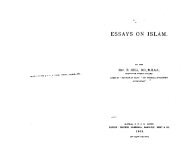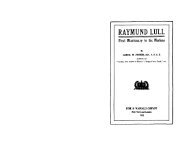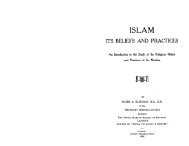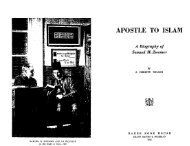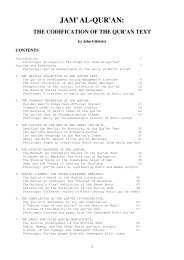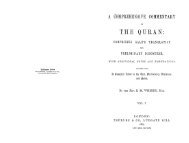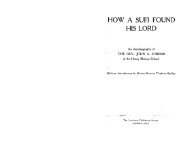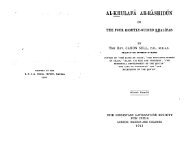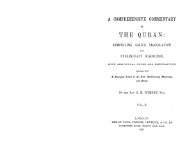Guillaume--Life of Muhammad.pdf - Radical Truth
Guillaume--Life of Muhammad.pdf - Radical Truth
Guillaume--Life of Muhammad.pdf - Radical Truth
Create successful ePaper yourself
Turn your PDF publications into a flip-book with our unique Google optimized e-Paper software.
52 The <strong>Life</strong> <strong>of</strong> <strong>Muhammad</strong><br />
79 hermaphrodite. Am I to make him a man or a woman I' By God I do not<br />
know what to do and I can see no way out.' She said, 'Good God, merely<br />
follow the course <strong>of</strong> the urinatory process.' 'Be as late as you please henceforth<br />
Sukhayla' you have solved my problem,' said he. Then in the morning<br />
he went ou~ to the people and gave his decision in the way she had<br />
indicated.<br />
HOW QU~AYY B.<br />
KILAB GAINED POWER IN MECCA;<br />
HOW HE UNITED QURAYSH AND THE HELP WHICH<br />
QUJ;>A'A GAVE HIM<br />
In that year f?ufa behaved as they were accustomed. The Arabs had bor~e<br />
them patiently since they felt it a duty in the time <strong>of</strong> Jurhum and Khu2a a<br />
when they were in authority. Qu!?ayy came to them wl~h hl~ tnbesmen<br />
from Quraysh and Kinana and Qurja'a at al-'Aqaba saymg, We hav~ a<br />
better right to this authority than you.' (T. They dIsputed one. wI:h<br />
another and they tried to kill him.) Severe .fightmg followed resultmg 10<br />
the defeat <strong>of</strong> f?ufa, and Qu~ayy assumed theIr authonty. .<br />
Thereupon Khu2a'a and B. Bakr withdrew from .ou~ayy knowmg that<br />
he would impose the same restrictions on them as $ufa had done and that<br />
he would come between them and the Ka'ba and the rule <strong>of</strong> Me~ca. When<br />
they had withdrawn, Qu~ayyshowed his host~lity ~nd gathered hIS forces_:o<br />
fight them. (T. His brother RizaJ:1 b. Rabi a wIth hIS men from Qurja a<br />
stood with hi~.) Khuzii'a and B. Bakr came out against him and a sev~re<br />
battle took place in the valley <strong>of</strong> Mecca and both parties suffered heavtly.<br />
Thereupon they agreed to make peace and that one <strong>of</strong> the Arabs should<br />
arbitrate between them. They appointed as umpire ya'mar b: 'Auf ,b.<br />
Ka'b b. 'Amir b. Layth b. Bakr b. 'Abdu Manat b. Kmana. HIS verdlet<br />
was that Qu~ayy had a better claim to the Ka'ba and to rule Mecca than<br />
Khuza'a and that all blood shed by Qu~ayy was to be cancelled and com-<br />
80 pensation disregarded, but Khuza'a and B. Bakr must pay bloodwlt for the<br />
men <strong>of</strong> Quraysh, Kinana, and Qurja'a whom they had kIlled a~d that<br />
Qusayy should be given a free hand with (he Ka'ba and Mecca. Ya mar b.<br />
'A';f was immediately called al-Shaddakh because he had cancelled the<br />
claim to bloodwit and remitted it (10 4)'<br />
Thus Qu~ayy gained authority over the temple and Mecca and brought<br />
in his people from their dwellings to Mecca. He behaved as a king over<br />
his tribe and the people <strong>of</strong> Mecca, and so they made hIm klllg; but he<br />
had guaranteed to the Arabs their customary rights because he felt<br />
that it was a duty upon himself which he had not the nght to alter. Thus<br />
he confirmed the family <strong>of</strong> f;)afwan and 'Adwan and the mtercalators ~nd<br />
Murra b. 'Auf in their customary rights which obtamed unttl the comlllg<br />
<strong>of</strong> Islam when God put an end thereby to them all. Qu~ayy was the first <strong>of</strong><br />
1 The point was important because a male received double as much as a female.<br />
The <strong>Life</strong> <strong>of</strong> <strong>Muhammad</strong> 53<br />
B. Ka'b b. Lu'ayy to assume kingship and to be obeyed by his people as<br />
king. He held the keys <strong>of</strong> the temple, the right to water the pilgrims from<br />
the well <strong>of</strong> Zarnzam, to feed the pilgrims, to preside at assemblies, and to<br />
hand out the war banners. In his hands lay all the dignities <strong>of</strong> Mecca; he<br />
divided the town into quarters among his people and he settled all the<br />
Quraysh into their houses in Mecca which they held.<br />
People assert that the Quraysh were afraid to cut down the trees <strong>of</strong> the<br />
sanctuary in their quarters, but Qu!?ayy cut them down with his own hand<br />
or through his assistants. Quraysh called him the 'uniter' because he had<br />
brought them together and they drew a happy omen from his rule. So far<br />
as Q~raysh wt:Te concerned no woman was given in marriage, no man<br />
marrIed, no discussion about public affairs was held, and no banner<br />
<strong>of</strong> war was entrusted to anyone except in his house, where one <strong>of</strong> his sons<br />
would hand it over. When a girl reached marriageable age she had to come<br />
to his house to put on her shift. The shift was split over her head in his<br />
house, then she put it on and was taken away to her people.I His authority<br />
among the Quraysh during his life and after his death was like a religious<br />
law which could not be infringed. He chose for himself the house <strong>of</strong> meeting<br />
and made a door which led to the mosque <strong>of</strong> the Ka'ba; in it the<br />
Ouraysh used to settle their affairs (105)'<br />
'Abdu'l-Malik b. Rashid told me that his father said that he heard al<br />
Sa'ib b. Khabbab, author <strong>of</strong> al-Maqfiira, reporting that he heard a man 81<br />
telling 'Umar b. al-Khallab when he was caliph the story <strong>of</strong> Qu~ayy, how<br />
he united .Quraysh and expelled Khuza'a and B. Bakr from Mecca, and<br />
how he gamed control <strong>of</strong> the temple and the affairs <strong>of</strong> Mecca. Umar made<br />
no attempt to gainsay him. (To Qu~ayy's authority in Mecca, where he<br />
enjO-yed great esteem, remained uncontested. He left the pilgrimage un~<br />
changed because he deemed it a religious taboo. The Sufa continued,<br />
until they were cut <strong>of</strong>f, in the family <strong>of</strong> f?afwan b. al-I;Iarith b. Shijna by<br />
right <strong>of</strong> inheritance. 'Adwan, the Nas'a <strong>of</strong> B. Malik b. Kinana, and Murra<br />
b. 'Auf continued as before until Islam came and God destroyed all these<br />
<strong>of</strong>fices.)<br />
When Qu~ayy's war was over his brother Riza\t b. Rabi'a went away to<br />
his own land with his countrymen. Concerning his response to Qu~ayy he<br />
composed the following poem:<br />
When a messenger came from Qu~ayy<br />
And said 'Respond to your friend's request,'<br />
We sprang to his aid leading our horses,<br />
Casting from us the half-hearted and slow-moving.<br />
We rode all night until the dawn<br />
Hiding ourselves by day lest we should be attacked.<br />
Our steeds were swift as grouse hurrying to water<br />
Bringing our answer to the call <strong>of</strong> Qu~ayy.<br />
I The dir< was 8 large piece <strong>of</strong> cloth. Normally a woman cuts an opening through which<br />
ahe can put her head. She then adds sleeves and sews up the two sides.



